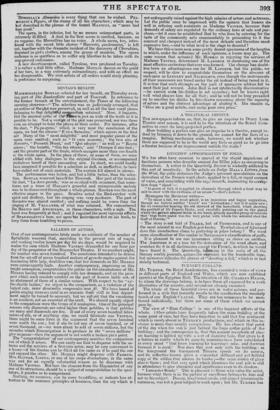SALARIES OF ACTORS.
ONE of our contemporaries lately made an estimate of the number of Spitalfields weavers that, according to the present rate of wages, and working twelve hours per day for six days, would be required to realize the sum which Madame VESTRIS demanded for one hour per day of the proprietor of the Haymarket Theatre, if we recollect aright, the number was seven hundred. The conclusion intended to be drawn from the set-off of seven hundred makers of gros-de-naples against the fascinating little lady, doubtless was, that her demands on Mr. MORRIS were extravagantly high. Another contemporary, improving on this bright conception, congratulates the public on the circumstance of Mr. MORRIS having refused to comply with her demands, and on the pros- pect which such resolute conduct on the part of leSsees holds out, of an abatement of those of a similar natim. With respect to the " ca'- the-shuttle bodies," we object to the comparison, as a violation of the logical rule, inter dissimilia comparatio non fit. We have heard of psalm-singing weavers (and in an oratorio their skill in that depart- ment might be turned to account), but we submit that the vocalizing is an accident, not an essential of the craft. We should equally object to the comparison were the terms of it analogous. One of the principal reasons why diamonds are rated higher than pebbles, is that pebbles are many and diamonds are few. If out of every seven hundred fabri- cators of silk, or of anything else, we could fabricate one VESTRIS, there might be some force in the argument that the seven hundred were worth the one ; but if she be not one of seven hundred, or of seven thousand, or—we were about to add of seven millions, but the miracles which Emancipation is to produce in the "seven millions" give us pause—then the argument is not worth a broken pin's point. The "congratulation" of our contemporary matches the comparison out of which it arises. We can easily see that to dispense with the sa- laries and the services of a first-rate actor, may be very convenient to a lessee—if his theatre can be filled all the same as if he paid the one and enjoyed the other. Mr. MORRIS might dispense with FARREN, Mrs. GLOVER, LISTON, or any of his corps dranzatique, in the same way and for an equally substantial reason as he dispenses with Madame VESTRIS. But how the absence from the Haymarket of any one of its attractions, should be a subject of congratulation to the spec- tators, it puzzles us to comprehend. Nothing, we conceive, can be more twaddling, or indicate less at- tention to the common principles of business, than the cry which is not unfrequently raised against the high salaries of actors and actresses. Let the public once be impressed with the opinion that lessees dot well in refusing such assistants as Madame VESTRIS, because their demands of salary are regulated by the ordinary laws of sale and pur- chase,—let it once be established that he who lives by catering for the. taste of the community acts commendably in presenting to it the. coarsest and cheapest instead of the most delicate and therefore most expensive fare,—and to what level is the stage to descend ? We have this season seen some pretty decent specimens of the lengths to which, under the influence of such opinions, a lessee may go.. The same reason that actuated Mr. MORRIS in rejecting the services of Madame VESTRIS, determined M. LAPORTE in dismissing one of the most effective orchestras that ever was formed. '1 he change has doubt- less been an advantageous one for M. LAPORTE, but the public, we suspect, will be slow to congratulate themselves on the absence of such men as LINDLEY and NicnoesoN, even though the instruments of their successors are tuned under the pit instead of being tuned in it. It is true that such attempts on the part of managers seldom fail to meet their just reward. John Bull is not intellectually discriminative —he cannot state his dislikes in set speeches ; but he knows right well what pleases him for all that ; and he will not be long prevailed on to smother his dislike by fine-drawn reasoning about the rapacity of actors and the abstract advantage of abating it. His maxim is "Give me a good article, and make your own price."


















 Previous page
Previous page